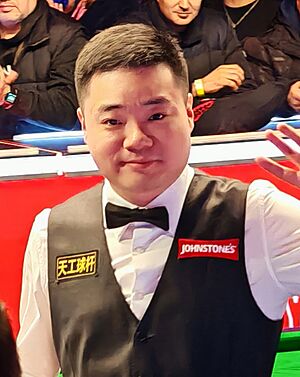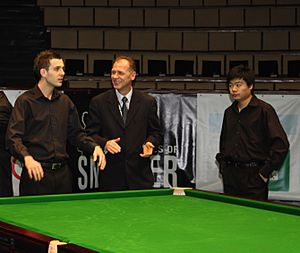Ding Junhui facts for kids

Ding at the 2025 Masters
|
|||||||||||||||||||||||||||||||||||||||||||||||
| Born | 1 April 1987 Yixing, Jiangsu, China |
||||||||||||||||||||||||||||||||||||||||||||||
|---|---|---|---|---|---|---|---|---|---|---|---|---|---|---|---|---|---|---|---|---|---|---|---|---|---|---|---|---|---|---|---|---|---|---|---|---|---|---|---|---|---|---|---|---|---|---|---|
| Sport country | |||||||||||||||||||||||||||||||||||||||||||||||
| Professional | 2003–present | ||||||||||||||||||||||||||||||||||||||||||||||
| Highest ranking | 1 (December 2014, January–February 2015) | ||||||||||||||||||||||||||||||||||||||||||||||
| Current ranking | 6 (as of 8 May 2018) | ||||||||||||||||||||||||||||||||||||||||||||||
| Tournament wins | |||||||||||||||||||||||||||||||||||||||||||||||
| Ranking | 15 | ||||||||||||||||||||||||||||||||||||||||||||||
| Minor-ranking | 4 | ||||||||||||||||||||||||||||||||||||||||||||||
|
Medal record
|
|||||||||||||||||||||||||||||||||||||||||||||||
| Ding Junhui | |||||||||||||||
|---|---|---|---|---|---|---|---|---|---|---|---|---|---|---|---|
| Simplified Chinese | 丁俊晖 | ||||||||||||||
| Traditional Chinese | 丁俊暉 | ||||||||||||||
|
|||||||||||||||
Ding Junhui (Chinese: 丁俊晖; born 1 April 1987) is a famous professional snooker player from China. Many people consider him the most successful Asian snooker player ever. He has won 15 big tournaments called "ranking titles." These include the UK Championship three times, in 2005, 2009, and 2019.
In 2014, Ding made history by becoming the first Asian player to be ranked number one in the world. He has also reached the final of the Masters tournament twice, winning it in 2011. In 2016, he was the first Asian player to reach the final of the World Championship.
Ding started playing snooker when he was just nine years old. He became well-known internationally in 2002. That year, he won the Asian Under-21 Championship and the Asian Championship. At 15, he became the youngest person to win the IBSF World Under-21 Championship. He turned professional in 2003 when he was 16. His first major wins as a professional were in 2005. He won the China Open and the UK Championship. He was the first player from outside Great Britain and Ireland to win the UK Championship.
Throughout his career, Ding has made over 600 "century breaks." A century break is when a player scores 100 points or more in one turn. He has also made seven "maximum breaks," which is the highest possible score in one turn (147 points). He is the only Asian player to reach world number one. He lives in Sheffield, England, and owns the Ding Junhui Snooker Academy there.
Contents
Early Life and Training
Ding Junhui was born on April 1, 1987, in Yixing, Jiangsu, China. When he was eight, he went with his father, who loved pool, to practice with a local expert. While his father was away, Ding picked up the cue stick and played against the professional. Ding actually won the game!
After that, Ding's parents supported his training in cue sports, especially snooker. When he was nine, his father took him to the Chinese national snooker team's training center near Shanghai. His mother even sold their home and grocery business so Ding could focus on snooker as a career. The family moved to Dongguan, Guangdong. Ding left school at age 11 to practice snooker for eight hours every day.
His Snooker Journey
Starting His Professional Career
Ding became famous around the world in 2002 when he was 15. He won the Asian Under-21 Championship and the Asian Championship. He also became the youngest winner of the IBSF World Under-21 Championship. In 2003, he turned professional at 16. That same year, he became the top-ranked player in China.
First Big Wins and Top 16 Ranking
In 2004, Ding played in the Masters in London. He beat a top player, Joe Perry, but then lost a close match. In April 2005, Ding celebrated his 18th birthday by reaching the final of the China Open in Beijing. He beat several top players and then won against the famous Stephen Hendry. This match was watched by 110 million people in China, making it the most-watched snooker match ever!
In December 2005, Ding won the UK Championship. He beat Steve Davis in the final. This made him the first player from outside the UK to win this important tournament. His world ranking quickly jumped from 62 to 27.
In 2006, Ding won his third major tournament, the Northern Ireland Trophy. He beat Ronnie O'Sullivan in the final. This made him one of only three players under 20 to win three ranking titles. Later in 2006, he won three gold medals at the 2006 Asian Games in snooker. By the end of the 2006–07 season, Ding was ranked world number nine.
Youngest to Make a Maximum Break

In January 2007, Ding made a perfect 147 break at the Masters. This was his first maximum break and the first one made at that competition since 1984. It also made him the youngest player to make a televised 147 break. Ding reached the Masters final, but lost to Ronnie O'Sullivan. He was very upset during the match because of the loud crowd.
Despite some tough losses, Ding qualified for the World Championship for the first time. He ended the 2006–07 season ranked world number 11. In 2008, Ding won the Jiangsu Classic and another event in the World Series of Snooker. In December 2008, he made his second 147 break at the 2008 UK Championship.
Winning His Second UK Championship
Ding started the 2009–10 season well, reaching the quarter-finals of the Shanghai Masters. He then reached the final of the Grand Prix, but lost to Neil Robertson. At the 2009 UK Championship, Ding played brilliantly and won his second UK title by beating John Higgins in the final.
He continued to play well, reaching the final of the China Open, where he lost to Mark Williams. By the end of the season, Ding was ranked world number five.
Masters Champion
In January 2011, Ding reached his second Masters final. He won the tournament for the first time, beating Marco Fu in the first-ever all-Chinese Masters final.
Ding had his best run at the 2011 World Snooker Championship. He made it to the semi-finals for the first time, where he played Judd Trump in a very close match. Ding lost 15–17. He finished the season with a career-high ranking of world number four.
More Ranking Wins
In 2011, Ding and Liang Wenbo teamed up to represent China at the World Cup. They won the final against Northern Ireland. In 2012, Ding won his fifth ranking tournament, the Welsh Open, by beating Mark Selby. He also won the 2012 Championship League tournament.
In the 2012–13 season, Ding won the minor-ranking Scottish Open. He also won the Players Tour Championship finals, beating Neil Robertson. During this tournament, he made his fifth 147 break. He ended the season ranked world number 10.
Three Wins in a Row
In September 2013, Ding won his seventh ranking title at the Shanghai Masters. The final against Xiao Guodong was the first time two Chinese players met in a ranking event final. Ding won 10–6. He then won the first Indian Open, becoming the first player since 2003 to win two major ranking events in a row.
Ding continued his amazing streak by winning the International Championship. This was his third major ranking event win in a row, a feat not achieved since Stephen Hendry in 1990. After these wins, Ding reached world number three, then number two. He went on to win two more ranking titles: the German Masters and the China Open. This meant he won five ranking titles in one season, matching Stephen Hendry's record from 1990.
Becoming World Number One
In December 2014, Ding became the 11th player to be ranked world number one, and the first from Asia. This happened even though he lost early in the 2014 UK Championship. He held the top spot for a week.
World Championship Finalist
In 2015, Ding won the Haining Open, his first title with ranking points in 16 months. In February 2016, he made his sixth 147 break at the Welsh Open.
Ding had a fantastic run at the World Championship. He won several tough matches, including setting a new record of seven century breaks in a single World Championship match at the Crucible Theatre. With this victory, Ding became the first Asian player to reach the World Championship final. He made 15 century breaks during the championship. He lost the final 14–18 to Mark Selby.
Recent Years and Return to Form
Ding won the 2016 Six-red World Championship and his second Shanghai Masters title in 2016. In 2017, he and Liang Wenbo won the World Cup for China again. Ding also won the World Open.
In 2018, Ding reached the final of the World Grand Prix, but lost to Ronnie O'Sullivan. In 2019, he reached the semi-finals of the Masters.
At the 2019 UK Championship, Ding beat Ronnie O'Sullivan and then Stephen Maguire in the final to win his third UK title. This was his first ranking event win since 2017. He made ten century breaks during the competition.
After a period where his ranking dropped, Ding showed strong form in late 2022 and 2023. He reached the final of the 2022 UK Championship and the 2023 UK Championship, losing both to Mark Allen and Ronnie O'Sullivan respectively. In January 2024, he made his seventh 147 break at the Masters against Ronnie O'Sullivan. In 2024, Ding won his 15th ranking title at the 2024 International Championship in China, beating Chris Wakelin.
Achievements
Ding has won 15 ranking tournaments in his career. He has reached the World Championship final once (in 2016). He has been in the UK Championship final five times, winning three times (2005, 2009, 2019) and being runner-up twice (2022, 2023). He has also reached the Masters final twice, winning in 2011 and being runner-up in 2007.
He has made over 600 century breaks and seven maximum breaks (147 points) in professional matches. His first maximum break was at the 2007 Masters when he was 19, making him the youngest player to achieve a televised 147 at that time.
Personal Life
Ding enrolled at Shanghai Jiao Tong University in 2006 to study business. He lives in Sheffield, England, and practices at the English Institute of Sport in Sheffield. He is also a supporter of Sheffield United F.C., a football club.
In 2014, Ding married Zhang Yuanyuan, also known as Apple Zhang. They had a daughter in August 2018. Sadly, Ding's mother, Chen Xijuan, passed away from cancer in January 2017 at age 55.
Images for kids
See also
 In Spanish: Ding Junhui para niños
In Spanish: Ding Junhui para niños
 | Jewel Prestage |
 | Ella Baker |
 | Fannie Lou Hamer |




